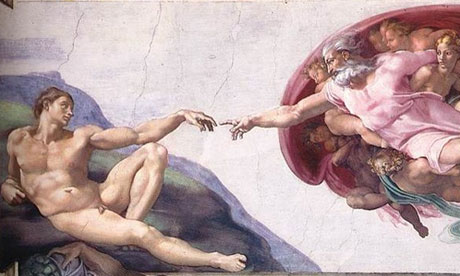The Vatican may eventually limit the number of visitors to the Sistine chapel to protect Michelangelo’s ceiling frescoes, Reuters reported.
The Sistine Chapel ceiling celebrated its 500th anniversary on Wednesday.
Pope Benedict XVI marked the anniversary of what he dubbed as the “liturgical classroom” with vespers. He said “the works of art which decorate [the chapel], especially the frescos, find in the liturgy … their living environment.”
On October 31, 1512, only 20 years after the discovery of America, Pope Julius II said an evening vespers service to inaugurate the room where Michelangelo toiled for four years, much of it on his back, to finish his ceiling frescoes.
The frescoes immediately became the talk of the town and have since become the talk of the world.
With mass tourism growing, however, critics warned that the 500-year old work of art may be in danger.
Some five million people visit the chapel every year, or as many as 20,000 a day in summer.
Italian literary critic Pietro Citati last month wrote an open letter in a major Italian newspaper denouncing the behaviour of crowds visiting the place.
He said tourists “resemble drunken herds” as they unwittingly risked damaging the frescoes with their breath, their perspiration, the dust on their shoes and their body heat.
The atmosphere, Citati wrote, was anything but contemplative as the tourists ignored the Vatican’s requests for silence, composure and a ban on taking photographs.
Antonio Paolucci, the director of the Vatican Museums, however, said in a Reuters report that he did not foresee limiting the number of visitors “in the short and medium term.”
He added, however, that the museums might not have any choice after that.
“Pressure caused by humans such as dust introduced, the humidity of bodies, carbon dioxide produced by perspiration can cause unease for the visitors, and in the long run, possible damage to the paintings,” Paolucci said in an article in the Vatican newspaper.
“We might limit the access, putting a cap on the number (of visitors). We will do this if tourism grows beyond the limits of reasonable tolerance and if we are not able to respond adequately to the problem,” he said.
Under the current system, visitors to the Vatican museums can either book times to enter or wait in long queues outside, but there is no cap on the total daily number.
In 1994, at the end of a 14-year restoration project, technicians installed an elaborate system of dehumidifiers, air conditioning, filters and micro-climate controls in the chapel.
But the number of visitors has grown in the past 18 years, putting the system under stress.
Sources
Additional readingNews category: World.




